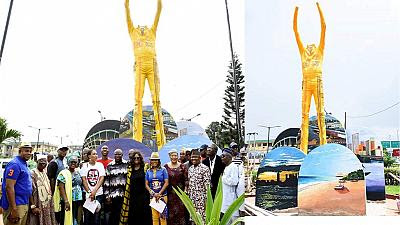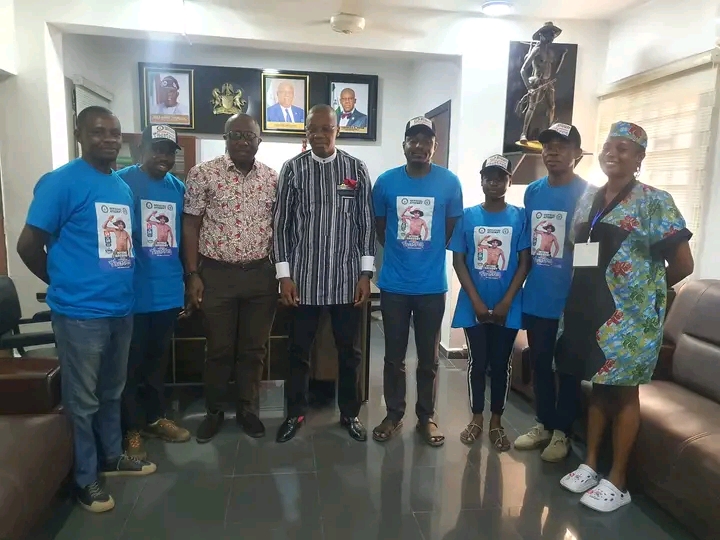Fela’s statue: Honouring legend, promoting tourism

Fela Kuti statue unveiled in Lagos to honour the Nigerian music legend Late Afrobeat King, Fela Anikulapo Kuti, whose statue was unveiled in Lagos last week, has added another dimension to tourism promotion and how to honour a legend.
Since the unveiling of the statue in Ikeja, Nigeria’s economic heartbeat, the area has been drawing Lagosians and people across the world who come their to admire it.
Indeed, desirous to promote tourism, Mr. Akinwunmi Ambode, Lagos State Governor unveiled the statue in honor of music legend.
Termed: ‘The Liberation Statue,’ it was brought to life by a Nigerian artist, Abolore Sobayo, who used fibre glass to design the golden headless effigy of the legend with its handless arms raised into the sky.
The statue is part of activities marking the 20th anniversary of Fela, who died in Lagos in 1997. “This artwork was created as a form of respect and remembrance to this legend;
what he stood for and fought for with his music; his mythology; struggle for freedom; fight for human dignity; social consciousness; courage and Pan-Africanism,” the governor said.
“Today, we celebrate a man who voluntarily turned his back on a life of comfort and privilege, and took up his saxophone as a weapon to fight for the liberation of our people from neo-colonialism and bad governance,” he added.
Also,Fela’s daughter, Yeni Kuti expressed gratitude to the governor and the artist for respecting the wishes of her father who hated statues by designing a headless and handless effigy.
She said,“The artist has said it is a spirit and when Fela was alive, he hated statues and so I think this effigy is a good representation of what Fela would have wanted because he did not like statues and that is why at the Museum you will notice that there is no statue of Fela.”
The ceremony ended at the New Afrika Shrine where the popular annual Felabration Festival, held in Fela Anikulapo Kuti’s honour came to an end.
Fela was sent to London in 1958 to study medicine, but diverted to music at the Trinity College of Music, where he formed the band, Koola Lobitos.
He later married in 1960; and moved to Nigeria in 1963 where he trained as a radio producer for the Nigerian Broadcasting Corporation.
The trumpeter re-formed his band in Nigeria, which played a Jazz and Ghanaian Highlife fusion. Fela moved to Ghana in 1967 where he named his musical fusion Afrobeat. The band played in the United States for months where Fela was attracted to the Black Power movement.
The band, which was renamed: The Afrika ’70 upon return to Nigeria, recorded music about social issues from the regular love songs.
Fela formed the Kalakuta Republic community, which had a recording studio and served as a home for band members and other musicians.
He further opened the Afro-Spot nightclub which was later renamed Afrika Shrine where he regularly performed and promoted the African traditional religion of the Yoruba ethnicity.
He changed his name to Fela Anikulapo Kuti, started singing in pidgin English and declared his Kalakuta Republic independent from Nigeria.
Fela became popular among the Nigerian public and unpopular with the government at the time which ordered raids on his community. He was beaten, arrested, home, records and instruments torched among others.
His popular song, Zombie, which was released in 1977, created a lot of buzz and notoriety against the ruling governments in West Africa.
Meanwhile, his eldest son, Femi Kuti, has maintained and managed his father’s Afrika Shrine where concerts and musical activities are held almost daily.







